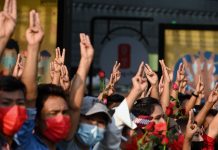
US-China tensions under the Biden administration are expected to have calm rhetoric and predictability amid a rough stance on Beijing.
President Donald Trump amplified the pressure on Beijing with policy measures that were often initially mentioned on Twitter.
“The issues that remain between the U.S. and China commercial relationship don’t change with (the) change of administration,” said Greg Gilligan, chairman of the Beijing-based American Chamber of Commerce in China.
“There’s pressure on both sides to remain fairly hawkish simply because domestic politics don’t allow for yielding the hawkish ground to someone else,” he noted.
However, CNBC said in an article that how US-China tensions would fare under the Biden administration remains unknown, especially the policy on tariffs, which have impacted businesses in both countries after China responded to U.S. duties with its own tariffs.
“Everyone needs to keep their powder dry,” said Scott Kennedy, senior advisor and Trustee Chair in Chinese Business and Economics at the Center for Strategic and International Studies.
“There is a lengthy transition to go through and a pandemic to bring under control,” he stressed. “Perhaps we’ll see a continuing ceasefire in the trade war, but it’s way too early to know if the tariffs will be removed or the actions against Huawei and others will be undone,” he added.
U.S.-China tensions to stay under Biden administration
According to analysts, a Biden administration would be able to negotiate with U.S. allies more effectively than Trump to come up with a more unified plan regarding its relations with China. Both Republicans and Democrats agree that there must be a tougher policy against the Communist Party-led country.
President-elect Joe Biden said in his initial speech that he would prioritize addressing the coronavirus pandemic and did not mention China.
Biden thinks “economic security is national security,” according to his foreign policy plan.
“The United States does need to get tough with China,” Biden wrote earlier this year in a “Foreign Affairs” article titled “Why America Must Lead Again: Rescuing U.S. Foreign Policy After Trump.”
“If China has its way, it will keep robbing the United States and American companies of their technology and intellectual property. It will also keep using subsidies to give its state-owned enterprises an unfair advantage — and a leg up on dominating the technologies and industries of the future,” he wrote.
“The most effective way to meet that challenge is to build a united front of U.S. allies and partners to confront China’s abusive behaviors and human rights violations, even as we seek to cooperate with Beijing on issues where our interests converge, such as climate change, nonproliferation, and global health security,” he added.
“Biden is reasonable,” Xu Hongcai, deputy director of the Economics Policy Commission at the China Association of Policy Science, said in a phone interview, according to a CNBC translation of his Mandarin-language remarks. “Biden, Obama, they understand the basics of holding a dialogue.”
For Xu, Biden’s win is “an end to the irrational era of Trump” and his use of tariffs, sanctions and other “crude” tactics for addressing unfair trade practices. Xu believes China could help the U.S. with infrastructure development and international trade. He mentioned that Beijing is already handling issues such as restructuring state-owned companies, which the U.S. was eyeing on with trade negotiations.






